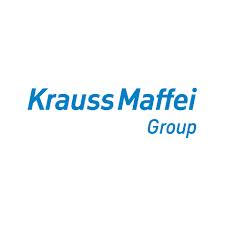|
– Physical foaming (MuCell) on all-electric AX
– Appearance at K 2013 trade show under the motto „Trendgineering“ |
|
(Munich, June 12, 2013) Production example of lightweight components made of thermoplasts offered to customers and visitors to KraussMaffei in double live operation at the K 2013 in Düsseldorf (October 16-23, Hall 15, B27 / C24 / C27 / D24). A dual platen machine in the CX series forms and back molds organic plates using the FiberForm process. The all-electric AX CellForm produces technical molded parts using the MuCell process.
|
|
Continuous fiber-reinforced thermoplast composites
Thanks to its proximity to standard injection molding, the FiberForm process for manufacturing continuous fiber-reinforced composites offers almost all of the known advantages for the production of fiber-reinforced components with plastic matrix. Short cycle times and complete automation capacity guarantee high productivity and ensure that the processes can be easily integrated in present-day injection molding machines and production plants. “Thermoplasts score on account of their short cycle times, the weldability and the options for function integration,” explains Frank Peters, Vice President Sales at KraussMaffei. “A component can thus take over a large number of additional functions.” A fully automatic production cell for the manufacture of a structure element made of organic plate with local reinforcement of areas subject to particularly high loads awaits visitors at the K 2013.
System competence for automation solutions tuned to production
As with many other processes for the production of composites, FiberForm also requires exact knowledge of the process chain so that at the end of the chain a production cell can be produced that is perfectly tuned to the product and customer requirements. On the one hand, this relates to the preparation and assembly of the fabrics by means of heating to the insertion of the plastic organic plates prior to actual injection molding. On the other hand, it relates to demolding and any possible final processing that is required after injection molding. This know-how resulted in optimized heating technology integrated in the automation of the new FiberForm production cell. The organic plates are heated evenly and extremely gently and are then inserted quickly with an industrial robot in a reproducible manner in the forming/injection molding.
Space-saving production cell
The focal point is a compact CX 300-1400 injection molding machine with a very short clamping unit and a dual platen design. This provides very wide clearances around the mold and permits space-saving and simple automation and the integration of additional peripherals. An industrial robot of type IR 300 R 233 S/K, which takes over all automation tasks, is installed on the fixed mold clamping platen. Operation and programming of the complete plant is by means of the MC6 control system either from the machine control system or the robot handheld unit. “Machine in the CX series have performed impressively for many years in heavy-duty production,” confirms Peters. “The fully hydraulic dual platen clamping system symmetrically applies clamping force to the mold and ensures optimum holding of the mold.” A servo pump drive and EcoPack insulation sleeves from the comprehensive BluePower kit guarantee maximum energy efficiency of the hydraulic CX.
All-electric foaming with MuCell
Apart from sustained demand from the automotive sector for medium-sized and large machines with MuCell technology, the process also plays an increasingly important role in the area of technical molded parts and household/white goods. These sectors, in particular, increasingly seek efficient production solutions that conserve resources in order to extend the sustainability concept to all life cycle phases of the products. As far as smaller injection molding machines are concerned, in particular, the all-electric AX series, with its high precision and shot weight consistency, is ideal for the CellForm process because, in this case, the compensatory holding pressure phase is not required. At the K2013, KraussMaffei will be exhibiting the MuCell process as a technological extension of the AX series in the form of the AX 130-750 CellForm production cell with integrated LRX 50. A new space-saving metering system from Trexel will also be used for the first time at the trade fair. The machine is equipped with an innovative safety system that guarantees user-friendly and safe handling of the machine. A special feature is that the active functions required for the foaming process, such as back pressure, can also be executed with opened safety gates by means of electric motor drives and in compliance with current safety standards.
Global MuCell competence network
To meet high customer demand, KraussMaffei and its partners offer a worldwide network of consulting competence. Numerous laboratory machines in Germany and the USA provide prospective customers with the opportunity to adapt their products and molds in practical operation to MuCell and to optimize them. In partnership with KraussMaffei at the University of Toronto, further development is being carried out on the combination of direct reinforcement and physical foaming using a injection molding compounder with a clamping force of 1000 tons. |
|
About KraussMaffei |
|
About the KraussMaffei Group
The KraussMaffei Group is among the world’s leading suppliers of machinery and systems for producing and processing plastics and rubber. Its products and services cover the whole spectrum of injection and reaction molding and extrusion technology, giving the company a unique position in the industry. The KraussMaffei Group is innovation-powered, supplying its products, processes and services as standard or custom solutions which deliver sustained added value along the customer’s value-adding chain. The company markets it’s offering under the KraussMaffei, KraussMaffei Berstorff and Netstal brands to customers in the automotive, packaging, medical, construction, electrical, electronics and home appliance industries. Continuing a long tradition of engineering excellence, the international KraussMaffei Group currently employs around 4,000 people. With a global network of more than 30 subsidiaries and more than 10 production plants, supported by around 570 sales and service partners, the company is close to customers around the world. KraussMaffei has been headquartered in Munich since 1838. For more information: www.kraussmaffeigroup.com |

